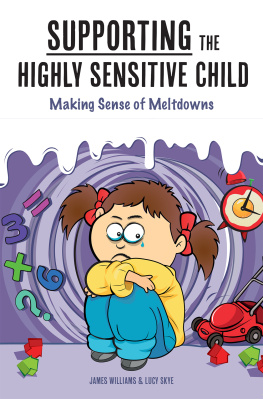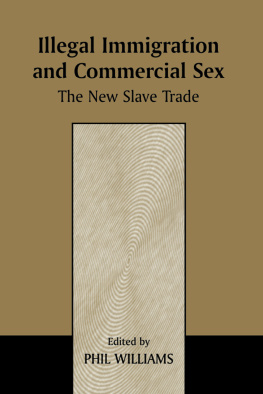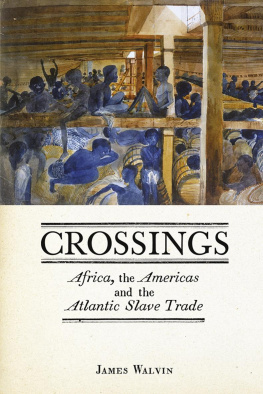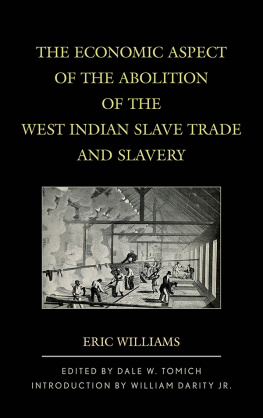DOVER THRIFT EDITIONS
GENERAL EDITOR: MARY CAROLYN WALDREP
EDITOR OF THIS VOLUME: JIM MILLER
Copyright
Copyright 2014 by Dover Publications, Inc.
All rights reserved.
Bibliographical Note
This Dover edition, first published in 2014, is an unabridged republication of the edition published in 1838 by G. Wightman, London, for The Central Emancipation Committee. The Note has been specially prepared for this edition.
International Standard Book Number
eISBN-13: 978-0-486-80067-7
Manufactured in the United States by Courier Corporation
78963201 2014
www.doverpublications.com
ADVERTISEMENT
WHEN THE NARRATIVE by JAMES WILLIAMS first appeared, great doubts were entertained as to the possibility of its truth; these doubts having been suggested to the Members of Her Majestys Government, at their instigation a Commission of Inquiry was issued by His Excellency, Sir Lionel Smith, Governor of Jamaica, directed to the Justice of the Peace of the parish of St. James, and the Special Magistrate of St. Elizabeth, to ascertain whether facts so disgraceful to human nature, and so flagrantly opposed to the Act of Emancipation, could by possibility be true. As soon as the Commission had concluded their investigation, their Report was published in Jamaica; and a private copy having found its way into this country, it was determined that no time should be lost in laying it before the public. The Government has acknowledged the Report; but where is the Evidence? Why is it not produced? Has it been read at the Colonial Office? If so, why is there a moments delay in placing before the nation a document so important and interesting?
That the evidence may more correctly be understood, the Narrative of James Williams is prefaced to it; and such references given as may identify the Narrative with the Examination.
A NARRATIVE OF EVENTS,
SINCE THE 1ST OF AUGUST, 1834.
By JAMES WILLIAMS, an Apprenticed Labourer in Jamaica.
The numbers, in James Williams Narrative, in Parenthesis, are placed for the purpose of giving the Reader an idea of the questions proposed to Mr. Senior and the other witnesses, by the Commissioners of Inquiry.
I AM ABOUT eighteen years old. I was a slave belonging to Mr. Senior and his sister, and was brought up at the place where they live, called Penshurst, in St. Anns parish, in Jamaica.
I have been very ill treated by Mr. Senior and the magistrates since the new law come in. Apprentices get a great deal more punishment now than they did when they was slaves; the master take spite, and do all he can to hurt them before the free come;I have heard my master say, Those English devils say we to be free, but if we is to free, he will pretty well weaken we, before the six and the four years done; we shall be no use to ourselves afterwards.
Apprentices a great deal worse off for provision than before time; magistrate take away their day, and give to the property; massa give we no salt allowance, and no allowance at Christmas; since the new law begin, he only give them two mackerel,that was one time when them going out to job.
When I was a slave I never flogged,I sometimes was switched, but not badly; but since the new law begin, I have been flogged seven times, and put in the house of correction four times.
Soon after 1st August, massa tried to get me and many others punished; he brought us up before Dr. Palmer, but none of us been doing nothing wrong, and magistrate give we right.
After that, Mr. Senior sent me with letter to Captain Connor, to get punished, but magistrate send me backhe would not punish me, till he try me; when I carry letter back to massa, he surprise to see me come back, he been expect Captain Connor would put me in workhouse. Captain Connor did not come to Penshurst; he left the parish. Massa didnt tell me what charge he have against me.
[No. 1.] When Dr. Thompson come to the parish, him call one Thursday, and said he would come back next Thursday, and hold court Friday morning. He come Thursday afternoon, and get dinner, and sleep at Penshurst, and after breakfast, all we apprentices called up. Massa try eight of we, and Dr. Thompson flog every one; there was five man and three boys; them flog the boys with switches, but the men flog with the cat. One of the men was the old driver, Edward Lawrence; Massa say he did not make the people take in the pimento crop clean; he is quite oldhead quite whitehavnt got one black hair in it, but Dr. Thompson ordered him to be flogged; not one of the people been doing any thing wrong; all flog for trifling, foolish thing, just to please the massa.
[No. 2.] When them try me, massa said, that one Friday I was going all round the house with big stone in my hand, looking for him and his sister, to knock them down. I was mending stone wall round the house by massas order; I was only a half-grown boy that time. I told magistrate, I never do such thing, and offer to bring evidence about it; he refuse to hear me or my witness; would not let me speak; he sentence me to get thirty-nine lashes; eight policemen was present, but magistrate make constable flog at first; them flog the old driver first, and me next; my back all cut up and cover with blood,could not put on my shirtbut massa say, constable not flogging half hard enough, that my back not cut at all:then the magistrate make one of the police take the cat to flog the other three men, and him flog most unmerciful. It was Henry James, Thomas Brown, and Adam Brown, that the police flog. Henry James was an old African; he had been put to watch a large corn pieceno fence round itso the cattle got in and eat some of the cornhe couldnt help it, but magistrate flog him for it. After the flogging, he got quite sick, and began coughing blood: he went to the hot-house, but got no attention, them say him not sick. He go to Capt. Dillon to complain about it; magistrate give him paper to carry to massa, to warn him to court on Thursday; that day them go to Browns Town, Capt. Dillon and a new magistrate, Mr. Rawlinson was there. Capt. Dillon say that him dont think Henry James was sick; he told him to go back, and come next Thursday, and he would have doctor to examine him: the old man said he did not know whether he should live till Thursday. He walk away, but before he get out of the town, he drop down deadall the place cover with blood that he puke up. He was quite well before the flogging, and always said it was the flogging bring on the sickness.












